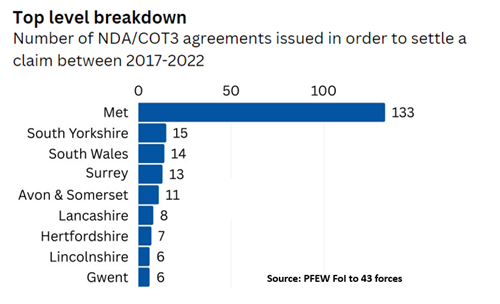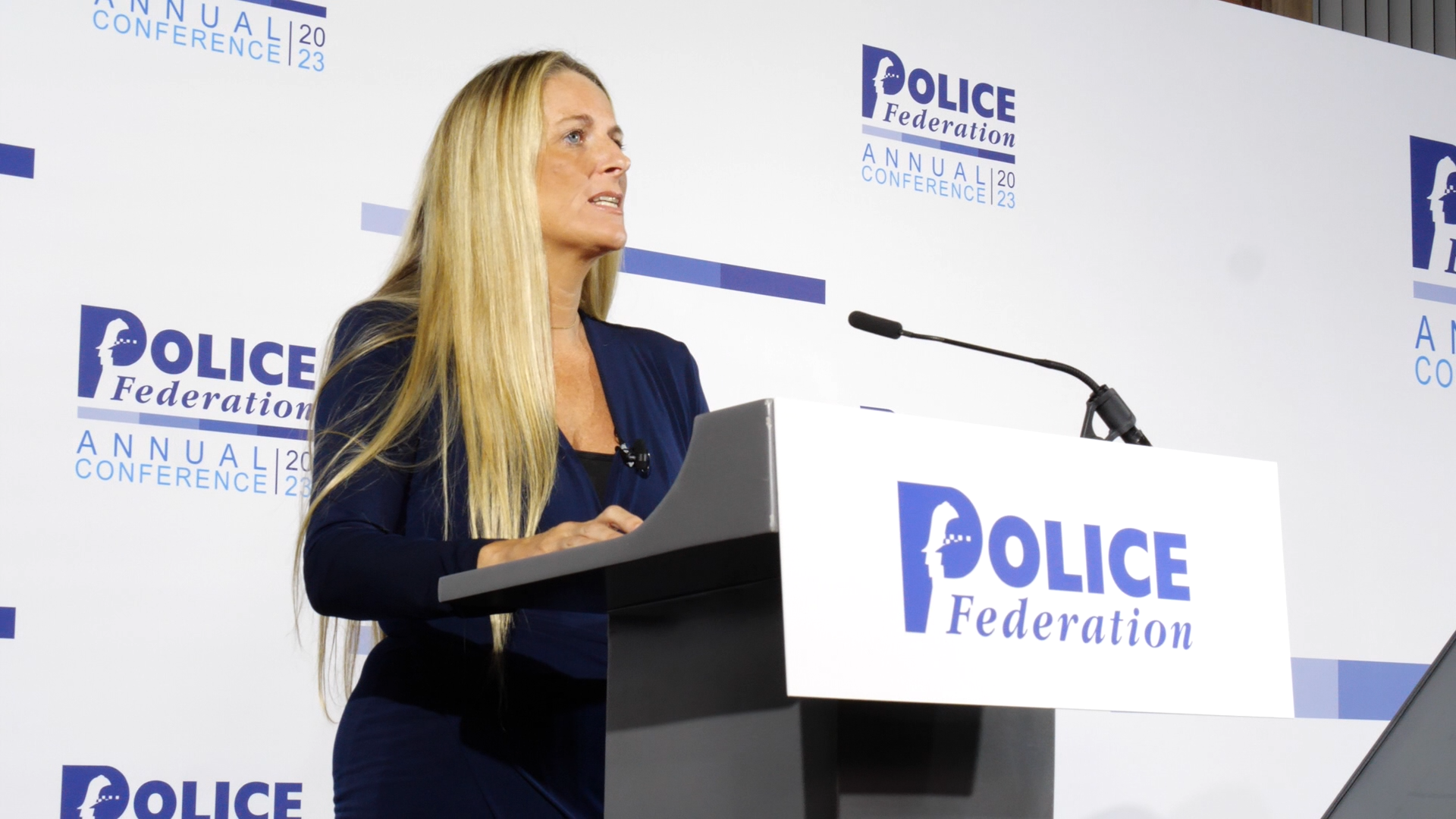Between 2017 and 2022, at least 243 NDAs have been handed out – with Durham Constabulary being the only force which has disclosed it is no longer using them.
Last year’s session on misogyny was a hit and this year’s session was no different.
On day one of the 2023 PFEW Annual Conference, this year’s session focussed on acknowledging and accepting where policing has got things wrong,
changing the culture and restoring trust in British policing.
Held virtually, the session began with Sue Honeywill, PFEW women in policing co-lead, laying out the current landscape of British policing and the prevalence of misogyny.
“We cannot get away from the fact there have been far too many instances of misogyny and sexism involving some members of the police service, fire service and armed forces in recent years,” she said. “Sadly, this has included a few police officers committing acts of violence and abuse against women, including behaviour towards colleagues.
“This has a devastating impact on every decent hardworking police officer out there doing a difficult job in incredibly challenging times. I have spoken to several male colleagues who tell me, it’s tough being a male police officer at the moment. It remains our intention to take everyone on this journey, as we continue to address misogyny in policing, but by no means is it lost on me how divisive and emotive this subject remains.”
Sue added both the London Fire Brigade and London’s Metropolitan Police have been subject to damning independent reviews designating them as “institutionally misogynist”.
“Never has public trust and confidence in the police been so low,” she continued. “That said, we are seeing a real drive to make significant cultural changes, and this is welcomed.
“There has been an acknowledgement and acceptance that there is an issue. This is a big step forward for policing. Misogyny is no longer a forbidden word within the service.
“We all need to work together to address the societal issue of misogyny and more specifically those faced within the public services.
“Last year I ended our Misogyny in Policing conference session by asking this question: ‘Is addressing sexism and misogyny in policing possible?’ I still firmly believe the answer to this is ‘yes’ but only if lessons are learned.”
To begin with the session focussed on the use of non-disclosure agreements (NDAs) to prevent victims sharing their stories and experiences.

A recent FoI submitted by PFEW has revealed between 2017 and 2022, at least 243 NDAs have been handed out – with Durham Constabulary being the only force which has disclosed it is no longer using them.
When asked about the issues surrounding NDAs, Women in Policing Co-Lead Belinda Goodwin said: “This is real, it was only really when we started looking because of the behaviours we had been seeing that we discovered how NDAs are being used.”
Belinda commented on how the use of NDAs are slowing the progress made against changing the culture of misogyny: “We can only learn if we know what the problems are.”
The impact of NDAs on victims is often severe and this was confirmed by Belinda as she described the impact of the employment tribunals on the victims. She said: “Many of the officers become mentally ill as a result, to endure the process of an employment tribunal and then be told you can’t talk about it because of an NDA is humiliating, and its wrong.”
The Federation is calling on chief constables to cease the use of non-disclosure agreements designed to silence victims, conceal unacceptable behaviour, and put the reputation of forces ahead of legitimacy.
There were two guest speakers, the first of which was Kathryn Billing, chief fire officer for Cornwall Fire and Rescue Service, the service’s first ever female chief who gave her experiences of misogyny within the fire service.
“There is an absolute acceptance across the National Fire Chiefs Council (NFCC) that we must address it. We find that non-disclosure agreements are quite prohibitive in the context of learning.”
When asked to define misogyny, Belinda said: “It’s culture, behaviour, and language. Sexual harassment in the workplace is mainly perpetrated by men - but misogyny is wider. Women can be misogynistic to other women, so women have a part to play in calling this out. Males and females need to come together to report it.”
Also on the panel was ITV 1 Wales News presenter Justina Simpson who shared her work on investigating misogyny in the fire service.
“It all started 18 months ago when a cleaner came out after working 20 years in a fire station and was being systematically abused by a fire fighter. It took everything within her to speak out.
“I am currently speaking to six women who are being silenced with NDAs. There is one case where a woman was paid £40,000 to protect a senior fire officer.”
On the barriers she has faced during her investigation, she said: “Unfortunately the experiences that we have had with the fire service is they are only interested in protecting their reputation.”
Following the presentations, TalkTV host Ian Collins facilitated a Q&A session with the panel.
The discussion touched on several key topics including strategies for moving forward, a multi-agency approach to changing culture, and a new PFEW Sexual Harassment Toolkit.
Sue shared more on the support offered by PFEW to its members, adding: “We need to make sure all of our members know that we are here as a federation to support them.
“Last year we developed a Sexual Harassment Toolkit which has been distributed to all of our federation branch boards up and down the country to ensure we are working together.
“We want professional standards departments to directly refer victims to their local federation for support from trained reps. We have equality reps that are specially trained to deal with these cases.”
The session provided an in depth look at misogyny and demonstrated the ways officers can work together to drive it out.
If you would like to find out more on what you can do, visit www.polfed.org or contact your local branch.
Watch the session back below.














